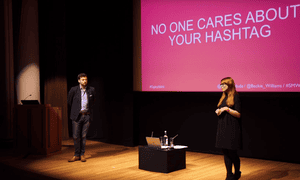Emojis and quizzes led the way at Social Media Week 2015

http://www.theguardian.com/media-network/2015/sep/24/emojis-social-media-week-london-2015
Social Media Week has changed a lot over the past four or five years. What started out with agencies, platforms and brands (it was nearly always 90% agencies) creating mini pop-up events has now developed into something more akin to a three-day business summit.
But the industry continues to evolve as does the output of participants; you can’t get away with poor presentations any more. Keeping that in mind, here are my five key takeaways from Social Media Week London 2015:
i believe emojis have been very popular as a lot of people use it on there smart phone through social sites and text messages mostly to show there emotions or feelings or how they are feeling at that particular time and emojis is trending as each emoji has a different face relating to different people therefore been very popular.
TV must push back against Apple and Netflix, says Discovery boss
David Zaslav, who was America’s best-paid chief executive last year with a total package worth more than $156m, said broadcasters and producers should resist pressure to serve up programming piecemeal to the benefit of technology giants.
He told senior executives from the BBC, ITV and Sky, among others: “Apple is a fantastic company and there’s probably nobody better at building the right consumer interface. Netflix and Amazon and all the device opportunity, all these things are great.
“But the thing we’ve got to remember is every one of these things, and I don’t mean to be pejorative, it’s just a device.
I believe without netflix there would be no entertainment and without an iphone/smartphone there would be not source to watch these on as smartphones gives us a chance to interact/ watch movies and share our stories with people.
